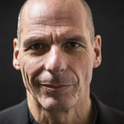Where would you expect to encounter a French MP? Probably in the National Assembly, sporting one of the expensive navy suits that are fashionable in the Macron government. But, when I meet Raphaël Arnault, the newly elected MP for the first constituency of Vaucluse in Avignon is wearing shorts and a football casual’s Stone Island jacket, in the throng of an anti-fascist protest on Walthamstow High Street, east London.
Even in the Palais Bourbon, the meeting place of the National Assembly, Arnault doesn’t look like a typical MP. The 29-year-old, with his neck tattoos and punk earrings, is the co-founder of the Lyon-based anti-fascist youth group the Young Guard. He is at this protest in London to “inform himself” and because as an anti-fascist “[you] must follow the far right wherever they go”. The far right is increasingly acting internationally, he adds, and the “racist atrocities” by rioters after the Southport attacks could easily be reproduced in France.
The Young Guard is considered an effective force in Lyon. Aline Guitard, a deputy mayor in the city from the French Communist Party, praised the group earlier this year for protecting the party’s offices from the far right. However, Arnault’s organisation has received criticism for its violent methods. In 2022 Arnault was convicted of “violence as part of a group” when he and four other activists pinned someone they suspected to be in the fascist group Generation Identity to a wall to make him unlock his phone. Arnault is appealing this decision.
In France, self-described fascists are often armed with knives
Arnault, who became an anti-fascist at 15 when he saw neo-Nazis attack non-white protesters, supports the use of violence if necessary. “We must not fall into violence for violence’s sake. But the people we are against are capable of extreme violence, and we must be able to respond to that.”
The Young Guard, he claims, never starts the violence. “Fascists—self-described fascists—in France are often armed with knives. If they are attacking a protest, we have no choice but to leave them lying on their arse. There’s no other way to say it.” These activities saw Arnault designated as a “fiché-S” terrorism suspect—meaning a possible threat to state security—and placed on a police watchlist. Arnault says that doesn’t mean much—“there are sixth formers with the fiché-S label in France”, but his opponents used the designation as an attack line against him during this summer’s election campaign.
Not all of his constituents mind. Sometimes people joke about it with him in the street, he says. But he was “alarmed” by some of the news coverage characterising him as a terrorist, and he worried he would be physically attacked.
Arnault calls his seat in Vaucluse “a little island amid a tidal wave of the far right” in Avignon, a generally right-wing area of France. “Some things in politics are unmeasurable,” he says. “One of those is the dynamic that we were able to create with our youth movement and the boost we got from our activism over the years.”
He was elected in July as part of the New Popular Front left-wing alliance on the ticket of the populist left La France Insoumise (LFI), with enough centrist voters backing him against the far right in the second round. He credits his win to “the very real fear of the far right” in France.
His arrival in the National Assembly shocked the French system. Much was made of him being the first MP to be listed as fiché-S and his unconventional style was criticised by traditionalists. A photo of him and three other fashionable young LFI MPs looking tired after a day at the assembly went viral when a staffer from the far-right National Rally party compared them to the “court bench in Bobigny [a working-class suburb of Paris]”. “I thought we were dressed sharply!” he quips. The reaction included people calling the MPs, who were of different ethnicities, “racaille” (“street scum”)—evidence, Arnault says, of the “deep racism and class hatred in French politics”.
Arnault says his decision to seek elected office was motivated by the need to fight fascism in all arenas. From brawls on the streets of Lyon to the Palais Bourbon, Raphaël Arnault will follow the far right wherever they go—even, it seems, rainy Walthamstow.













